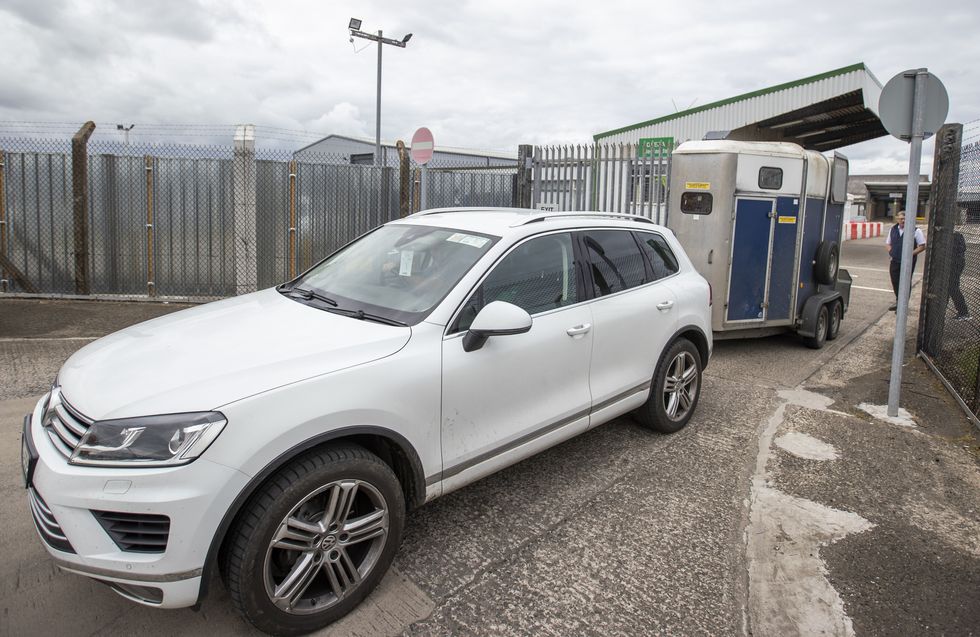Cars getting heavier with more SUVs and electric vehicles on the road prompt fears parking costs may spike

Average new cars on the road are likely to break the 2,000kg barrier soon
| GETTY
The research found that electric cars are around 150kg heavier than petrol and diesel counterparts
Don't Miss
Most Read
Latest
Damning new evidence has found that the average weight of new cars in the UK has risen by almost 400kg in seven years, potentially causing havoc for drivers when looking to park.
In 2016, the average weight of new road cars tested by experts was 1,553kg, whereas last year, it had grown to a staggering 1,947kg.
Driver trends have had a huge impact on the weight of vehicles. In the UK, sport utility vehicles (SUVs) are becoming one of the most popular vehicle types as Britons look for a more comfortable drive, as well as ensuring they have enough space for their families.
Despite this, the popularity of SUVs, and large electric vehicles with large lithium-ion batteries, will eventually contribute to fears that vehicles are becoming far heavier.
Do you have a story you'd like to share? Get in touch by emailing motoring@gbnews.uk

Cars have become 400kg heavier since 2016 on average
|PA
The vast majority of SUVs are larger and heavier than their saloon or hatchback counterparts as seen with the Skoda Kodaiq weighing 246kg more than the Skoda Superb at 1,751kg.
The research from Autocar found that electric vehicles are almost 150kg heavier than conventional petrol or diesel models, with smaller city cars also becoming less popular among consumers.
However, hybrid vehicles available with both combustion and electrified powertrains are "significantly heavier" than electrified models.
For example, the Peugeot e-208 is 342kg heavier than the equivalent ICE model, the Kia Niro EV weighs 399kg more than the hybrid version and the BMW i5 eDrive40 is 405kg heavier than the mild-hybrid 520i.
Mark Tisshaw, editor of Autocar, said previous research showed that cars are getting too long for regular parking spaces, but the new data shows they are getting heavier too, further fuelling fears the UK could follow the lead of Paris.
He added: "This increase is being accelerated by the popularity of SUVs and EVs – which are heavier than traditional body styles and powertrains – and the declining number of lightweight city cars, which would offset heavier models.
“Paris recently introduced measures that triple parking costs for the heaviest models and British politicians have hinted that similar measures may find their way to the UK.
"If such legislation comes into force here, UK motorists will need to pay even closer attention to the weight of their next new car.”
Some experts have warned that there could be issues in the future with the stability of multi-storey car parking structures amid fears vehicles are getting heavier.
Many multi-storey parking structures were built in the 1970s, with some already seeing signs of wear and tear, which is likely to worsen as vehicles get heavier.
Speaking last year, structural engineer Chris Whapples told The Telegraph that there was "potential" for some older car parks in poor condition to collapse.
With the overall trend of vehicles getting heavier, there is concern that older car parks could face further difficulty with the additional weight, especially as car ownership rates remain stable.
LATEST DEVELOPMENTS:
- Sadiq Khan's Congestion Charge to see 100,000 drivers hit with huge daily costs under new rules
- Electric car drivers to save 20 per cent on public charging costs around the UK at the 'perfect time'
- Petrol and diesel drivers face filling station chaos as fuel prices remain too high for British motorists
 Paris recently voted to increase parking charges for SUVs | REUTERS
Paris recently voted to increase parking charges for SUVs | REUTERSWhapples added that car park operators would be best placed to get their properties assessed "from a strength point of view" and ensure they are stable for years to come.
Otherwise, more parking operators could consider implementing weight limits to the structures to ban the heaviest vehicles from entering.
This has already been seen in regions like South Hampshire and West Devon to deal with vehicles getting longer and not fitting inside standard parking bays, including the Mercedes S-Class and Tesla Model S.










